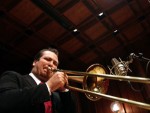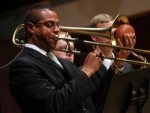Title
As he prepares to conduct the first alumni big band in the Juilliard Jazz program’s 10-year history, Brandon Lee, a Jazz Studies graduate who is now the assistant director of the Juilliard Jazz Orchestra, is struck by the accuracy of something he learned during his early days here. “I was teaching at a summer festival program in Bassano del Grappa, this little town in northern Italy,” Lee said in a recent interview, “and who should also be there but another Juilliard Jazz grad, drummer Ulysses Owens (B.M. ’06). He’d finished his studies and was now in the singer Kurt Elling’s band. That saying ‘it’s a small world’? It’s especially true in jazz.”
Body
Lee (B.M. ’05, M.M. ’07, Artist Diploma ’08) had an even bigger point to make about the world of Juilliard alumni. “When you’re working out ideas in an environment as competitive and creative as this one,” he said, “it’s natural for there to be some contentious moments between students. You just get on each other’s nerves sometimes. However, what’s impressed upon us [in the program] is that the person you’re rehearsing with may impact your future in many respects, so get to know them and their playing well. As your work takes you places, it’s very likely that you’ll end up gigging with, or perhaps hiring, some of your former classmates. That’s true with any generation of musicians.”
Of course, the immediate world beyond the conservatory consists of the hard work of building a reputation in more established groups, which is probably why the first-ever Jazz Studies alumni concert, on March 31—which kicks off of the Jazz program’s 10th-anniversary celebrations—will be a bona fide homecoming, a reunion jam. “I haven’t seen many of my fellow Juilliard Jazz-ers since our graduation,” said participating trombonist Ryan Keberle (Artist Diploma ’03), a New York scene regular who just completed an extended run on Broadway in the musical In the Heights and toured with indie-pop musician Sufjan Stevens. Not surprisingly, filling an orchestra was no easy task given the busy schedules of other grads. Bassist Ben Williams (M.M. ’09) balances membership in ensembles led by pianist Jacky Terrasson and vibraphonist Stefon Harris, with side gigs accompanying guitar star Pat Metheny. Norwegian guitarist Lage Lund (Artist Diploma ’05), who won the prestigious Thelonious Monk Competition shortly after graduating from Juilliard, will leave from the alumni gig for a recording session with arranger Maria Schneider’s Orchestra. (He’s also a regular in Latin-jazz saxist David Sanchez’s quintet.) “The alumni selected are all wonderful players,” said Dominick Farinacci (B.M. ’05), a trumpeter who recently collaborated with Grammy-winning producer Russ Titelman and has enjoyed considerable success in Japan leading his own groups. “I’m thrilled that I could make it.”
Juilliard Jazz Artistic Director Carl Allen, the drummer who took over the program in 2007 from its founding head, Jazz at Lincoln Center-associated saxist Victor Goines, feels a reunion was an idea whose time had finally come. “By any measurable standard the 10th year is a milestone in the program,” he said. “We’ve graduated nearly 100 musicians in that time, but even though the Juilliard name carries so much weight, many people who are familiar with the School’s amazing history of classical music, dance, and drama often still don’t realize there’s a jazz program here.” For emphasis, Allen refers to a bit of jazz-associated lore that still circulates, unflattering though it may be. “Miles Davis, Chick Corea, and Phil Woods attended the music school decades ago and left somewhat unfulfilled because there was nothing like what we’re doing [with Jazz Studies],” he said. “Two years ago when we gave Quincy Jones an honorary doctorate, he was so moved that at one point he said to me, ‘Carl, I just never thought the day would come that Juilliard would have a jazz program.’ Funnily enough, that was right around the time Barack Obama was elected, and it made me smile because it felt like a similar reaction.”
The concert’s repertoire will be another way in which the Juilliard Jazz program shows what it’s made of. It will consist of compositions by many of the orchestra members, culled from the library of original pieces and arrangements amassed throughout the program’s tenure. “Writing is an integral part of the curriculum,” Brandon Lee said. “Students are required to do a concert of originals each year.” Allen thinks this process is particularly rewarding. “I would like to see the compositional component get even bigger,” he said. “I mean, even when we have a student concert that features standards, I have the pupils write their own arrangements of the material. I’ve found that to be really beneficial because it allows the student a bit of ownership over the music. Jazz is about adding personality to the music, after all, whether it be through improvisation or compositionally.”
Now that higher education has become such a proving ground for aspiring jazz talent, it’s also inevitable that members of Juilliard’s first jazz generation would find fairly quick routes into academia. Trinidadian-born alumnus Etienne Charles (M.M. ’08), a trumpeter, was recently made an associate professor at Michigan State University, while trombonist James Burton (Artist Diploma ’05, M.M. ’09) is now director of jazz studies at Snow College in Utah. Allen makes no secret of his thrill that his former pupils are experiencing the same teaching challenges they once afforded him. “A few of us were out in Utah at a camp beginning to discuss the alumni [concert] idea when I overheard James and some other musicians talking,” Allen began. “I think Etienne was there, too, but anyway at one point they turned to me and said that in addition to the concert, they’d like some time with the students, in order to talk about stuff they’d only recently found out. Things like recording your rehearsals, which is required but most students balk at,” Allen said with a laugh. “To myself, I was like, ‘Uh-huh, so now you get it.’ Then I told them, “Yes, I’m sure I can make that happen.”






